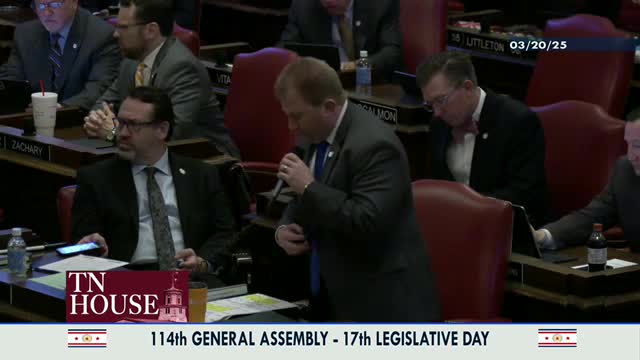Tennessee lawmakers advance Property Rights Protection Act under chairman Hosey's leadership
This article was created by AI summarizing key points discussed. AI makes mistakes, so for full details and context, please refer to the video of the full meeting. Please report any errors so we can fix them. Report an error »

In the heart of Tennessee's legislative chamber, the air buzzed with purpose as lawmakers gathered for the House Floor Session on March 20, 2025. The agenda was packed, with resolutions and bills vying for attention, but one proposal stood out among the rest: the Tennessee Property Rights Protection Act.
As the session unfolded, Chairman Hosey took the floor to introduce this pivotal legislation. He explained that the current law allowed housing authorities and community development agencies to seize entire areas deemed "blighted." This broad definition often led to the displacement of residents and the loss of homes. The proposed act aims to refine this terminology, shifting from "blighted area" to "blighted property." This change would ensure that only specific properties, rather than entire neighborhoods, could be targeted for redevelopment.
"This bill is about protecting the rights of property owners while still allowing for necessary development," Hosey stated, emphasizing the balance the legislation seeks to achieve. The implications of this bill are significant, as it seeks to empower individuals and provide clarity in property rights, a topic that resonates deeply with many Tennesseans.
The session also featured a series of resolutions and bills, including congratulatory measures and various legislative proposals, all of which were placed on the consent calendar for streamlined consideration. The atmosphere was one of collaboration, with lawmakers working together to navigate the complexities of governance.
As the session progressed, the House voted overwhelmingly in favor of the consent calendar, signaling a unified front on several issues. With 94 votes in favor and none against, the passage of the consent calendar marked a successful step forward for the legislature.
The discussions surrounding the Tennessee Property Rights Protection Act and other legislative measures reflect a commitment to addressing the needs of the community while ensuring that the rights of individuals are upheld. As the session drew to a close, the focus remained on the future implications of these decisions, leaving many to ponder how these changes would shape the landscape of property rights in Tennessee.
As the session unfolded, Chairman Hosey took the floor to introduce this pivotal legislation. He explained that the current law allowed housing authorities and community development agencies to seize entire areas deemed "blighted." This broad definition often led to the displacement of residents and the loss of homes. The proposed act aims to refine this terminology, shifting from "blighted area" to "blighted property." This change would ensure that only specific properties, rather than entire neighborhoods, could be targeted for redevelopment.
"This bill is about protecting the rights of property owners while still allowing for necessary development," Hosey stated, emphasizing the balance the legislation seeks to achieve. The implications of this bill are significant, as it seeks to empower individuals and provide clarity in property rights, a topic that resonates deeply with many Tennesseans.
The session also featured a series of resolutions and bills, including congratulatory measures and various legislative proposals, all of which were placed on the consent calendar for streamlined consideration. The atmosphere was one of collaboration, with lawmakers working together to navigate the complexities of governance.
As the session progressed, the House voted overwhelmingly in favor of the consent calendar, signaling a unified front on several issues. With 94 votes in favor and none against, the passage of the consent calendar marked a successful step forward for the legislature.
The discussions surrounding the Tennessee Property Rights Protection Act and other legislative measures reflect a commitment to addressing the needs of the community while ensuring that the rights of individuals are upheld. As the session drew to a close, the focus remained on the future implications of these decisions, leaving many to ponder how these changes would shape the landscape of property rights in Tennessee.
View full meeting
This article is based on a recent meeting—watch the full video and explore the complete transcript for deeper insights into the discussion.
View full meeting